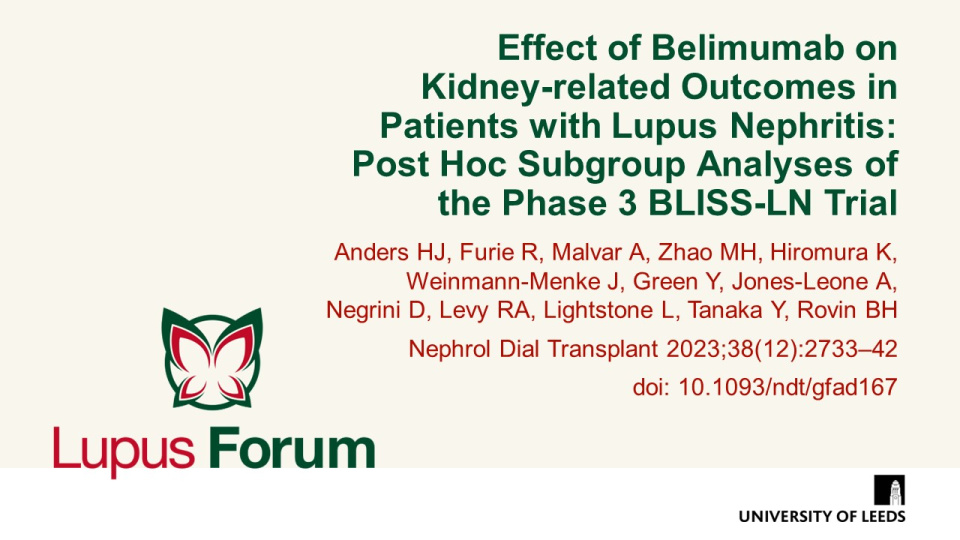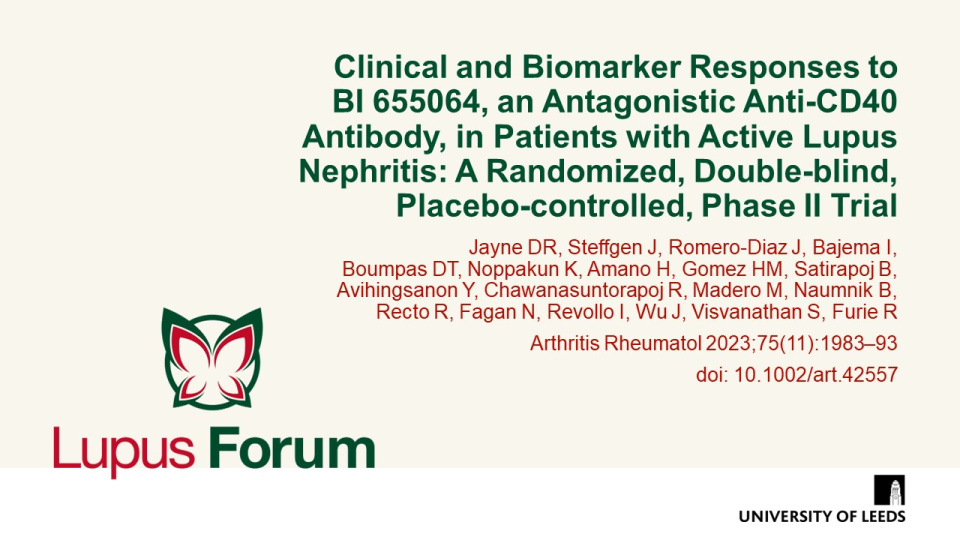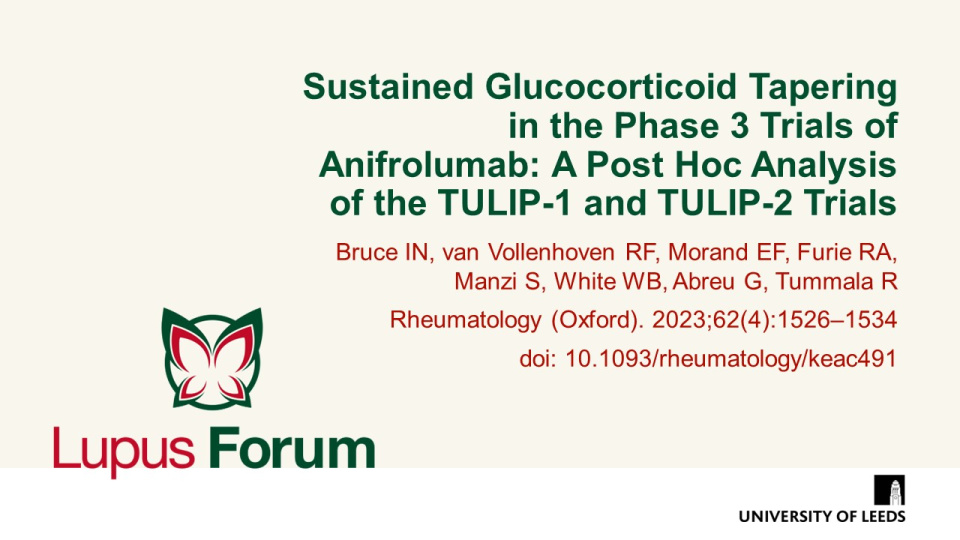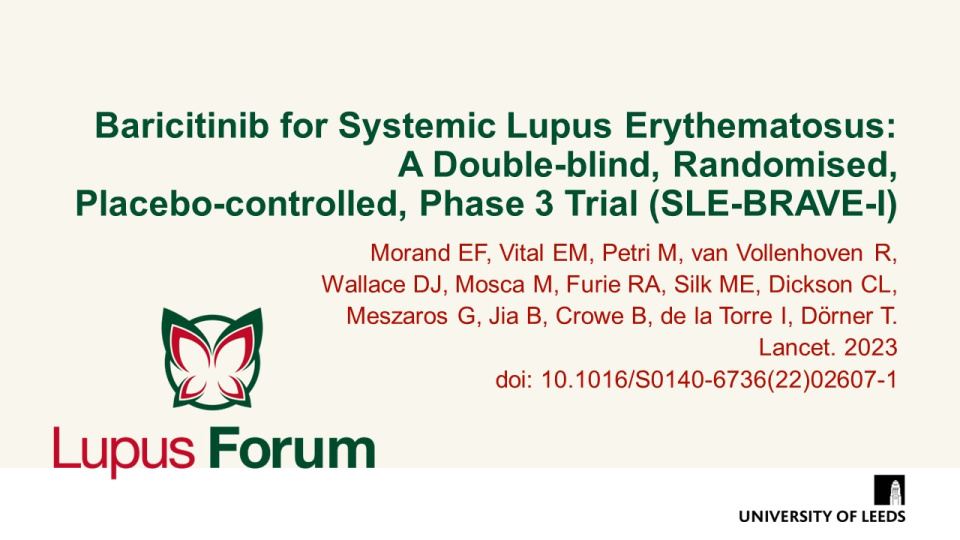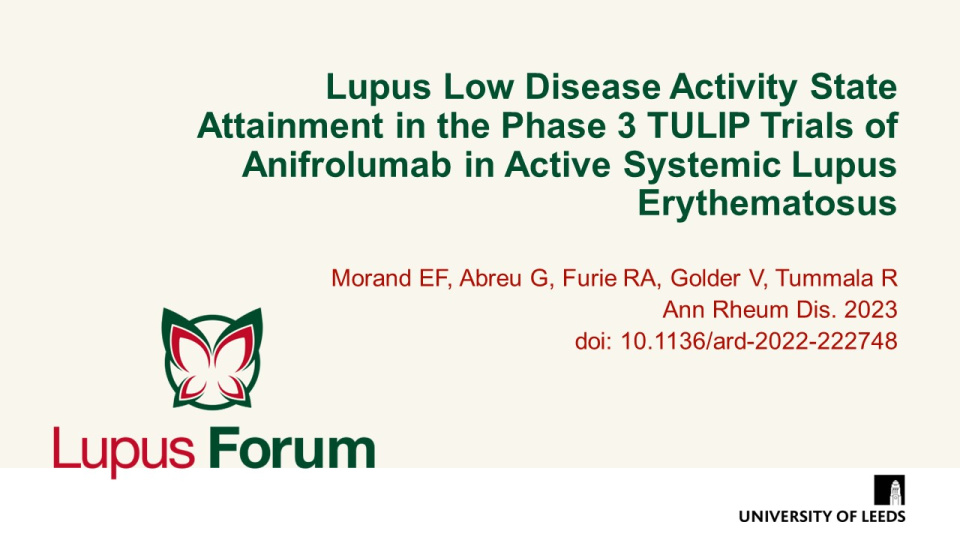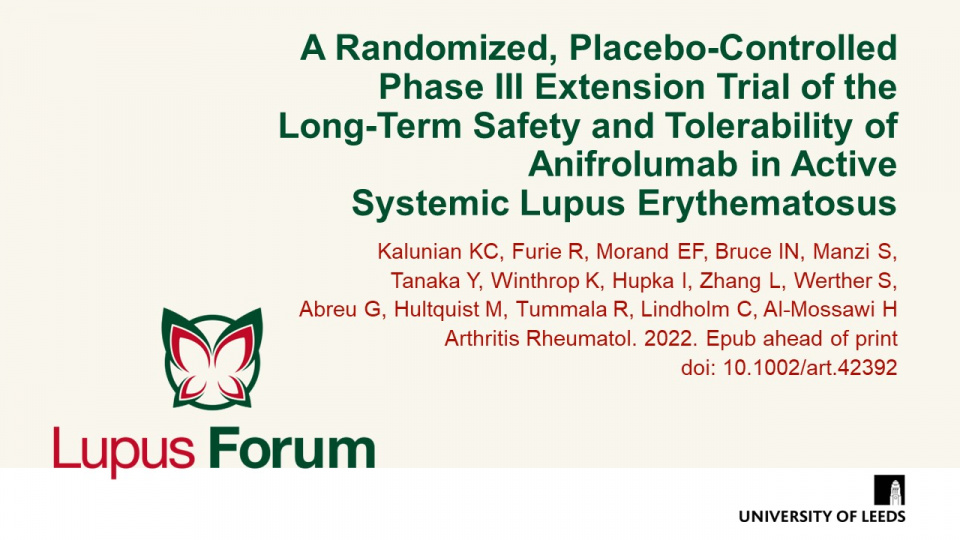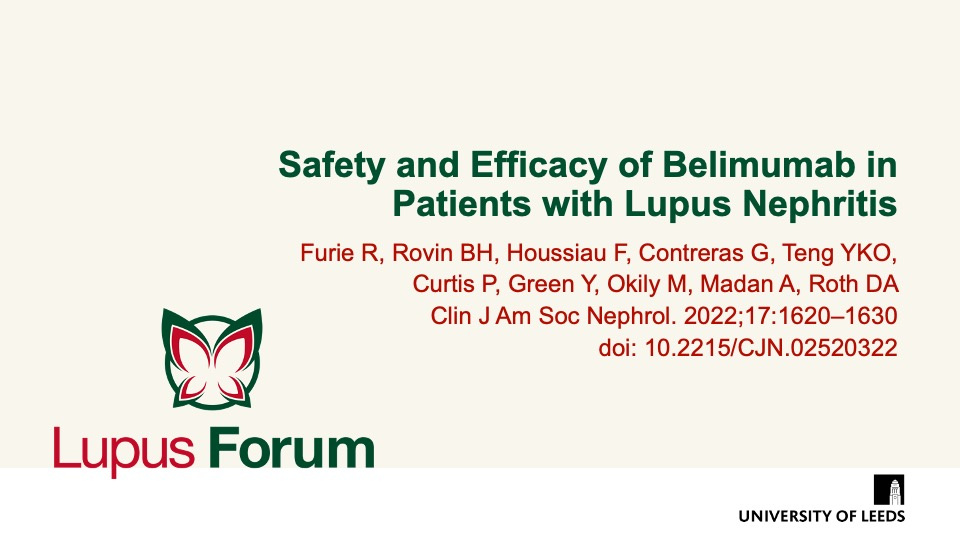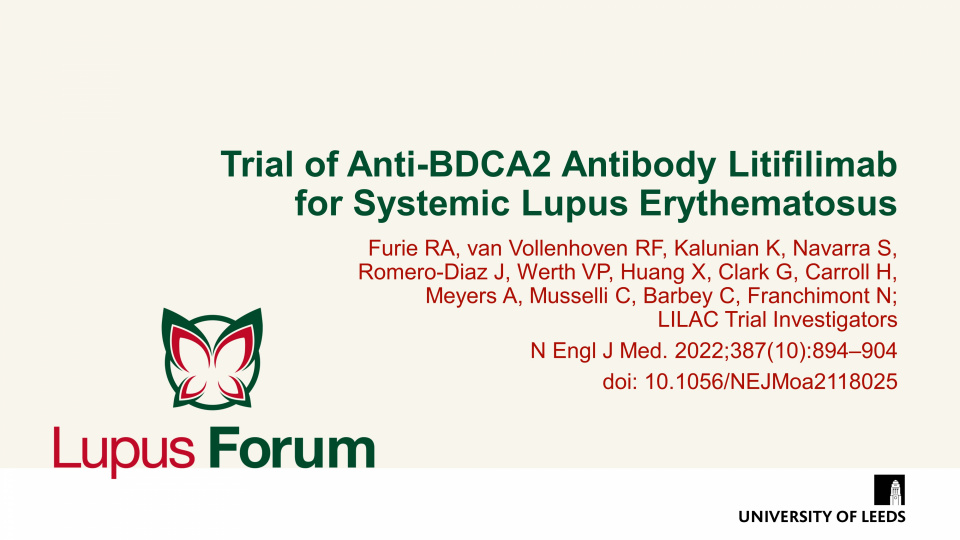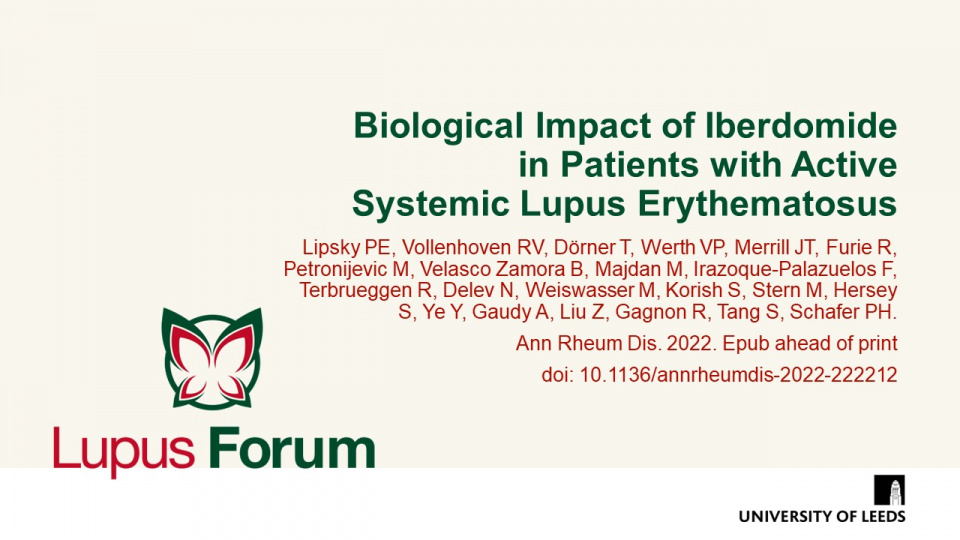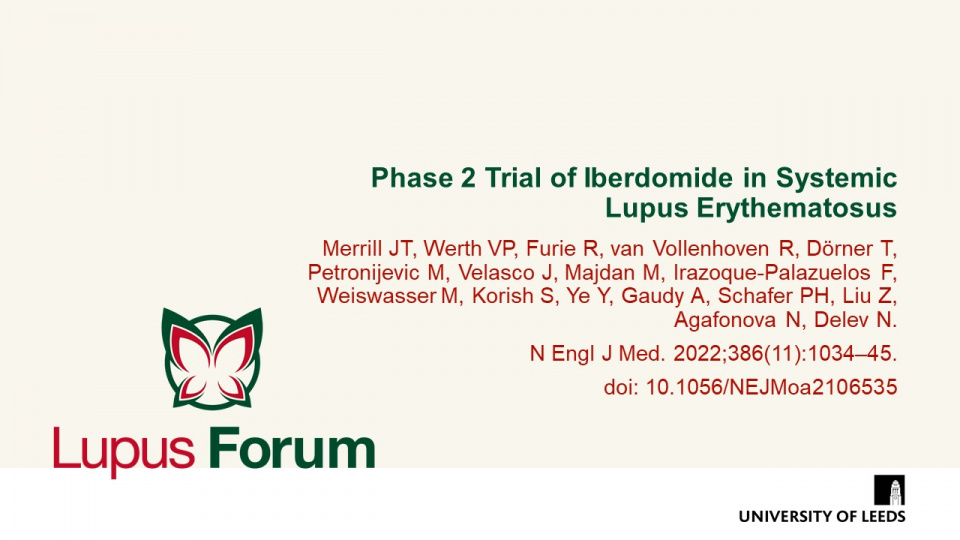Publications
Find coverage of the latest original articles on Lupus, focusing on those with data on therapeutic interventions and those that have clinical impact.
Effect of Belimumab on Kidney-related Outcomes in Patients with Lupus Nephritis: Post Hoc Subgroup Analyses of the Phase 3 BLISS-LN Trial
Nephrol Dial Transplant. 2023;38(12):2733–42 doi: 10.1093/ndt/gfad167 Epub ahead of print.
These data highlight the consistent benefit of belimumab versus placebo, combined with standard therapy, on kidney outcomes in both newly diagnosed and relapsed patients, and regardless of the use of GC pulses at induction.
Clinical and biomarker responses to BI 655064, an antagonistic anti-CD40 antibody, in patients with active lupus nephritis: a randomized, double-blind, placebo-controlled, phase II trial
Arthritis Rheumatol. 2023;75(11):1983–93 doi: 10.1002/art.42557.
This phase II study of BI 655064 in patients with active LN did not meet the primary endpoint of CRR at Week 52, however, post-hoc analyses suggest a potential benefit of BI 655064 180 mg in patients with active LN.
Sustained Glucocorticoid Tapering in the Phase 3 Trials of Anifrolumab: A post hoc Analysis of the TULIP-1 and TULIP-2 Trials
Rheumatology (Oxford). 2023 doi: 10.1093/rheumatology/keac491
Pooled analysis of the TULIP trials demonstrates that sustained glucocorticoid (GC) tapering is associated with several clinical benefits in patients with moderate-to-severe SLE.
Keywords:
Baricitinib for Systemic Lupus Erythematosus: a Double-blind, Randomised, Placebo-controlled, Phase 3 Trial (SLE-BRAVE-I)
Lancet. 2023 doi: 10.1016/S0140-6736(22)02607-1
Primary endpoint in SLE-BRAVE-I study was met for the 4 mg baricitinib group, however, key secondary endpoints were not.
Lupus Low Disease Activity State Attainment in the Phase 3 TULIP Trials of Anifrolumab in Active Systemic Lupus Erythematosus
Ann Rheum Dis. 2023. doi: 10.1136/ard-2022-222748
Post-hoc anaylsis of TULIP trials shows that, compared with placebo, anifrolumab treatment was associated with earlier, more frequent, and more prolonged and sustained lupus low disease activity state (LLDAS).
A Randomized, Placebo-Controlled Phase III Extension Trial of the Long-Term Safety and Tolerability of Anifrolumab in Active Systemic Lupus Erythematosus
Arthritis Rheumatol. 2022. Epub ahead of print doi: 10.1002/art.42392
Long-term extension study shows an acceptable long-term safety profile of anifrolumab in SLE, in addition to sustained improvements in disease activity and reduction in glucocorticoid use.
Safety and Efficacy of Belimumab in Patients with Lupus Nephritis
Clin J Am Soc Nephrol. 2022;17:1620–1630 doi: 10.2215/CJN.02520322
This 28-week, open-label extension of BLISS-LN found no new safety signals and maintained efficacy with belimumab, in patients with lupus nephritis.
Keywords:
Trial of Anti-BDCA2 Antibody Litifilimab for Systemic Lupus Erythematosus
N Engl J Med. 2022;387(10):894–904 doi: 10.1056/NEJMoa2118025
Phase 2 study, in patients with systemic lupus erythematosus, shows that litifilimab is associated with a greater reduction from baseline in the number of swollen and tender joints than placebo, over a period of 24 weeks.
Biological impact of iberdomide in patients with active systemic lupus erythematosus
doi: 10.1136/annrheumdis-2022-222212
Phase 2b study evaluating the pharmacodynamics and pharmacokinetics of oral iberdomide in patients with active SLE demonstrates that iberdomide significantly improves lupus disease activity and reduces hallmarks of the immunopathogenesis of SLE.
Keywords:
Phase 2 Trial of Iberdomide in Systemic Lupus Erythematosus
Kidney Int Rep. 2021;7(3):516-525 doi: 10.1056/NEJMoa2106535
This Phase 2 trial evaluated iberdomide in patients with moderate-to-severe systemic lupus erythematosus (SLE).


